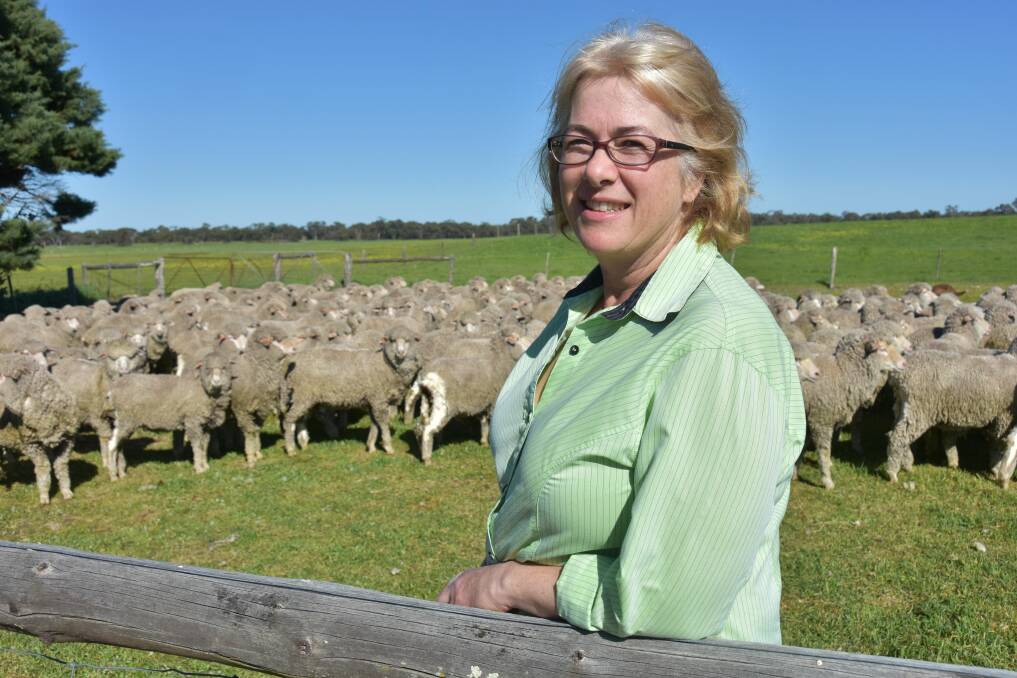
Australian Wool Innovation board aspirant, Janelle Hocking Edwards, says the grower-owned company needs to put more investment focus on research.
While she believes marketing is a core function of the AWI, she says the percentage of the budget spent on marketing (now 60 per cent) needs to be re-evaluated.
She also believes it's critical the industry finds viable alternatives to surgical mulesing but notes fewer sheep are being mulesed each year and more are being given pain relief in line with community expectations.
Dr Hocking Edwards, a South Australian sheep producer and former respected livestock researcher, is one of eight candidates vying for three vacancies on the AWI board.
She says it's important for all levy payers to vote (first they need to become shareholders) and if they lodge their ballot by proxy to make sure they direct their vote to their preferred candidates.
We have sent a list of 10 questions to all candidates. Dr Hocking Edwards answered nine.
Question: If elected, what would be your major priorities as a director of AWI?
Answer: I would draw on my career that spans from practical farming, through the paddock to the science laboratory to improve profitability and sustainability of Australian wool producers. I would re-invigorate the R&D focus of AWI to enable forward looking R&D. Evidence based opportunities, solutions and options for the Australian wool supply chain would be supported through efficient, effective, collaborative and world-leading RD&E. I will support strong, strategic and effective marketing campaigns that increase demand for Australian wool. I would like AWI to be considered a respected, trusted organisation that wool producers recognise adds value to their business.
Q: Do you think AWI has now got the balance right between marketing and research?
A: The balance between marketing and research needs to be re-evaluated. AWI is the Australian wool industry's company responsible for delivering research, development and marketing. I believe the balance has shifted too much towards marketing to the detriment of R&D opportunities. Nevertheless, marketing Australian wool is a very important role of AWI and should continue to be a significant core activity of the organisation.
Q: What do you think should be AWI's main research targets?
A: The current strategic plan adequately covers the strategic research areas that are important for Australian wool producers, covering healthy productive sheep, technology, wool harvesting, traceability, processing innovation and fibre science.
Importantly, the R&D should be collaborative to improve efficiency of levy expenditure. There is also an opportunity to take on the recommendation to develop a longer term (10-year) strategic plan. This will enable more strategic investment into blue sky/transformative research.
Q: Do you think the AWI is now transparent enough with its levy payers?
A: AWI has been working to improve its transparency since the independent review in 2018. Pleasingly, the 2019-2022 Strategic Plan has included a focus on transparency through monitoring and evaluation of each of its programs. In addition a Monitoring and Evaluation Overview has been produced recently. However, until we see outcomes from these documents, there is still room for improvement in both transparency and governance practices.
Q: The Merino flock has declined dramatically in size (thanks, in large part, to drought). What should be the AWI be doing to rebuild it?
A: Profitability, ease of management, technology, easy care, labour supply and environmental conditions will be the drivers for farmers to rebuild their flocks or move into Merino production. AWI should focus on R&D and especially E (extension) that increases profitability, ease of management and productivity to support producers in rebuilding the Merino flock.
Q: How important do you think it is to end surgical mulesing in the industry?
A: It is absolutely paramount that options and solutions are made available to Australian wool growers. The decision to cease surgical mulesing needs to consider the overall welfare of the sheep. Every year, fewer sheep are surgically mulesed and of those that are, there is an increase in the use of pain relief. The industry is responding to community expectations, albeit slowly.
Q: The AWI is often portrayed negatively in the media. What do you think needs to happen to change that or is the company the victim of the "usual suspects" out to stir up trouble?
A: Regaining the trust and confidence of shareholders and levy payers is essential for AWI to function effectively. This can be achieved by changing the culture of the board, setting the tone from the top. The role of a board is to direct and govern - noses in, fingers out. I would bring independence and fresh eyes to the board. I am open, honest, ethical and have integrity - traits essential to regain the trust of all Australian wool growers.
Q: Does the Australian wool industry's heavy dependence on the Chinese market worry you?
A: Yes.
Q: Any other comments?
A: Vote! If you can't be in attendance at the AGM, use a closed proxy vote. Make the decision, don't let someone else decide your vote. Do not use an open proxy. If you don't vote you are allowing others to decide the future of the Australian wool industry. Vote for change, not more of the same.
READ ABOUT THE OTHER CANDIDATES:
- Mulesing has to stay until viable alternative found says Webster
- AWI must stop embarrassing growers says Phil Holmes
- AWI's culture is broken and needs fixing says Paul Cocking
- George Falkiner says its time to rebuild the flock, end mulesing and beat blowflies
- Don't take your eye off the need for wool marketing says Merriman


